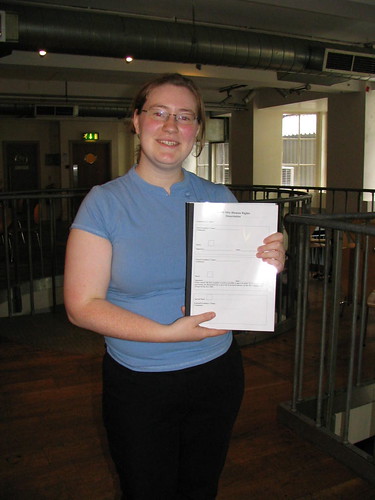One of the professors warned us that by the end we would be questioning whether what we said was in any way original because we had spent so much time with it. I know what he meant, but I just had to keep the panic attacks under control, try to sleep and eat and get through it. That last week was pretty darn intense and I wrote the conclusion last Friday morning. Still, I love the personalness of it; it says all the things that I think are wrong with the way we deal with human rights and what I would like to see done differently. There's a real sense of me and whether that's good or bad, it's there.

A Proud Joyce!
Conclusion:
Hannah Arendt wrote that the stateless person “was ‘an anomaly for whom there is no appropriate niche in the framework of the general law’ – an outlaw by definition. (Arendt 1966, p.283)” Her use of the word “outlaw” helps to illustrate why statelessness is such a complicated problem and why states and activists have had a very difficult time working together to solve it. States understand that anomalous nature and feel threatened by it, as they would by the presence of any outlaw. Human rights activists and international lawyers are perplexed by the animosity that states exhibit, because their understanding of the nature of statelessness arises out of the principles of international law and the human rights violations that are inflicted upon the stateless. It would be nice to write that states and activists each need to understand the perspective of the other, but that is simply not true. Within the context of the Westphalian world order, only the state matters and it is the activist who must be forced to adapt.
It should not sound as though the human rights person needs to abandon all the principles of the regime, the principles which have shaped the post-World War world for the better. Human rights needs more supporters, not deserters. Instead, lawyers and activists must use their re-understanding of the state’s statelessness phobia to become more effective advocates for change. As with any advocacy, those who want to help the stateless will be far more valuable if they can find ways to combat statelessness that directly address the reasons why states are reluctant to act. The goal is to find solutions that do not frighten or threaten the state or seem to undermine its legitimacy.
Sadly, this is more difficult than it would seem, since fear and perceived threats are fundamental elements in the state-stateless relationship. This is especially true in cases of denationalization, the way in which the vast, vast majority of people are rendered stateless. Denationalization is no accident, caused by a gap between domestic legal systems the way that original or marital statelessness are, but the result of a deliberate decision. Some factor prompted the state to act and, although the specifics of the case may differ, they are all rooted in fear. Sometimes this is fear of a political threat, whether from reorganized émigrés, majority political power, or old civil war enemies. At other times, it comes from a fear of the Other, the religious, ethnic, and cultural groups, who, instead of enriching a diverse society, are expelled precisely because of their differences.
Not only must activists learn to address statelessness in ways that alleviate the threat faced by individual states, but they must also learn to work with (and not against) the community of states. For many human rights people, this is a difficult prospect, since it is often so much easier to imagine a world in which human rights were the only ideal, than it is to learn to adapt to a confusing and frustrating world in which sovereignty, territorial integrity, and freedom of action are the principles upon which order is based. Statelessness threatens this order, as a whole, too, by creating an entire class of people who exist in the dangerous, and theoretically non-existent, no-man’s land between states. The creation of better international law (or the enforcement of the already existing law) depends upon state cooperation, while at the same time threatening their sovereignty. Voluntary renunciation of citizenship presents a conflict between the individual’s right to change their nationality and protest the acts of their state, while adding to the number of “scary” stateless people and undermining that state’s legitimacy as a member of the international community.
Fear, unfortunately, exerts a massive amount of influence upon the acts of both the state and the community of states. This is not a new war on terror paradigm, but one which has shaped state behavior for centuries. The stateless person, like other outlaws (including pirates and terrorists), “serve the state by signaling who will not be entitled to its protection, and throwing fear into the rest of us. (Kerber 2004, p.745)” Human rights activists are perfectly positioned to help citizens understand that stateless people are victims, not outlaws, and should continue to do so, but must go further and do work that helps convince states of this very same fact.
1 comments:
Congrats! I remember how great it felt to turn the dissertation in and then have a few pints at the tuns.
Post a Comment